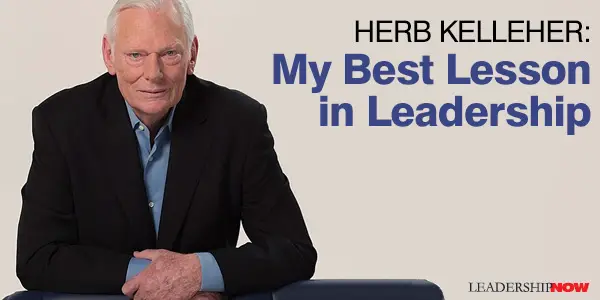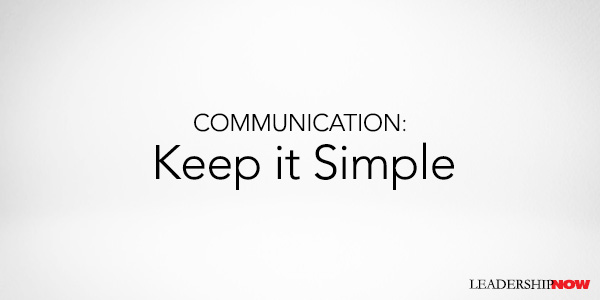 Leading Blog | Posts by Month |
 Leading Blog | Posts by Month |
10.29.08

Richard Branson on SuccessWhen we place too high a value on achievement and fulfillment, we often overlook the important parts of life like character, relationships and service. Richard Branson made a profound statement on success in his book, Business Stripped Bare. The last sentence may take a few reads for its implications to soak in.Successful people aren’t in possession of secrets known only to themselves. Don’t obsess over people who appear to you to be “winners”, but listen instead to the wisdom of people who’ve led enriching lives—people, for instance, who’ve found time for friends and family. Be generous in your interpretation of what success looks like. The best and most meaningful lives don’t always end happily.
Posted by Michael McKinney at 01:11 PM
10.28.08

Newswire: October 28, 2008 Learning from Success and Failure
Posted by Michael McKinney at 10:49 AM
10.27.08

Weeding Out the Leaders We NeedIn Time magazine this week, Michael Kinsley writes that we don’t just need a good man in the White House this time, we need a great man. He thinks both candidates have the seeds of greatness, but “unfortunately”—and this is what caught my eye—“our current political system seems designed to weed out precisely the qualities that are most needed at the moment.” He suggests that at a time like this we need astringency, not empathy. Feeling our pain won’t get it done. We need leaders willing to tell people what they don’t want to hear. “It's not comforting people about their current situation and reassuring them it will get better. It's telling them that the situation is likely to get worse and that only their efforts can determine how soon it will start getting better. Astringent leadership is Churchill calling on Britons to ‘brace ourselves to our duties.’” But he’s right. Who wants to put that in the White House? We vote for people that tell us that they will fix everything and not bother us. We vote for people that don’t make us take responsibility—who can place the blame somewhere else—who will level the playing field at someone else’s expense—smooth talk over straight talk. History teaches us that this always comes at a cost. It’s problematic for both leaders and followers. Both get their roles wrong and both pay a price. Kinsley writes: We have lucked out several times in our history when implausible characters showed unexpected greatness when it was needed: a country lawyer from Illinois, a spoiled patrician in a wheelchair, to name two obvious examples. Even more miraculous (though troublesome for democracy), both Lincoln and F.D.R. were elected by promising more or less the opposite of what they did in office. Lincoln said he'd preserve the institution of slavery. F.D.R. said he'd balance the federal budget.Can we expect this fortuitous turn of events again?
Posted by Michael McKinney at 10:56 AM
10.24.08

Newswire: Keeping Calm in a Crisis
Posted by Michael McKinney at 07:20 PM
10.22.08

Herb Kelleher: My Best Lesson in Leadership
HERB KELLEHER, founder and Chairman Emeritus of Southwest Airlines was asked, "What's the secret to building a great organization? How do you sustain consistent growth, profits, and service in an industry that can literally change overnight? And how do you build a culture of commitment and performance when the notion of loyalty -- on the part of customers, employees, and employers—seems like a quaint anachronism? He said, “I can answer basically in two words: be yourself.” My best lesson in leadership came during my early days as a trial lawyer. Wanting to learn from the best, I went to see two of the most renowned litigators in San Antonio try cases. One sat there and never objected to anything, but was very gentle with witnesses and established a rapport with the jury. The other was an aggressive, thundering hell-raiser. And both seemed to win every case. That's when I realized there are many different paths, not one right path. That's true of leadership as well. People with different personalities, different approaches, different values succeed not because one set of values or practices is superior, but because their values and practices are genuine. And when you and your organization are true to yourselves—when you deliver results and a singular experience—customers can spot it from 30,000 feet.
Posted by Michael McKinney at 12:14 AM
10.20.08

Nothing Can Grow Forever Nothing can grow forever, let alone at an exponential rate. Yet every fifty years or so, since the eighteenth century, the developed countries of the world economy have experienced a “go-go decade,” a decade during which growth was everything and everything was supposed to be growing forever. The first of these was around 1710, with the South Sea Bubble and John Law’s Louisiana schemes. The next was in the 1770’s and 1780s. There was a “go-go decade” around 1830, and another one around 1870. The one around 1910 was aborted—at least in Europe—by World War I; in the United States in continued until 1929. And then we had the 1960s and 1970s.  Every one of these “go-go periods was followed by a massive hangover, during which everybody believed that growth had stopped for good. It never did, and there is no reason to believe that it has stopped now. Every one of these “go-go periods was followed by a massive hangover, during which everybody believed that growth had stopped for good. It never did, and there is no reason to believe that it has stopped now.
But in every such period, growth shifts to new foundations. It then becomes important for business to think through where the growth areas are for its specific strengths, and to shift its resources out of the areas in which results can no longer be achieved into those areas where the new opportunities can be found. In every such period, obsolescence speeds up. And in turbulent times, an organized sloughing off of the past combined with a systematic concentration of resources are the first requirements of any growth policy. In every such period it is important for a business, but also for a non-business public service institution, to decide just how much it has to grow so as no to become marginal in its market. For if one’s market grows, one must grow with it—to be marginal means to become extinct. Adapted from Managing In Turbulent Times
Posted by Michael McKinney at 09:05 AM
10.17.08

Positive Relationships: It's About Them
it is what people give to a relationship rather than what they receive from the relationship that accounts for the positive effects. Although it is clear that positive relationships are advantageous to psychological, emotional, and physical health, research has found that it is the contributions made to others that account for the advantages. 
Posted by Michael McKinney at 02:53 PM
10.16.08

Out of Context: Success is in the Details"Success is found in much smaller portions than most people realize. A hundredth of a second here or sometimes a tenth of a second there can determine the fastest man in the world. At times we live our lives on a paper-thin edge that barely separates greatness from mediocrity and success from failure."
Posted by Michael McKinney at 07:23 AM
10.15.08

Communication: Keep it Simple
PROCTER & GAMBLE Chief Executive A. G. Lafley believes that simplicity is the key to good communication. He told the U.S. News and World Report: Repeat after me. If that sounds simplistic, Lafley is the first to admit that it is. Yet in a company where more than half the employees don't speak English as their first language, he says his Sesame Street- simple slogans, repeated over and over, keep everyone trained on what's important. Human beings "don't want to stay focused," he says. "So my job is to get them to focus their creativity around the focus; focus their productivity around the focus; focus their efficiency or effectiveness around the focus." Jack Trout, a promoter of simplicity, suggests in his book The Power of Simplicity, that these famous adages wouldn’t be so famous if they had been written with a heavier hand and fancier words: • Pulchritude possesses profundity of a merely cutaneous nature.
• It is not efficacious to indoctrinate a superannuated canine with innovative maneuvers.
• Visible vapors that issue from carbonaceous materials are a harbinger of imminent conflagration.
• A revolving mass of lithic conglomerates does not accumulate a congery of small green bryophitic plants.
Posted by Michael McKinney at 11:57 PM
10.13.08

Thinking Gray and Free
IN The Contrarian's Guide to Leadership, author Steven Sample, shares the idea that leaders think differently. “Leaders are able to maintain their intellectual independence by thinking gray and enhance their intellectual creativity by thinking free.” Leaders have to deal with ambiguities and unknowns. The idea is to learn to think gray while holding firmly to your core ideals. It’s not being binary and instant in your judgments and seeing the nuances to be found in many situations. Free thinking is more than just brainstorming. It’s brainstorming beyond your current reality. What would we do if we had no budgetary constraints, no time restrictions, no personnel problems, no legal restrictions, and no fear of failure? It’s to “contemplate absolutely outrageous and impossible” ideas and solutions. The leader whose thinking is constrained within well-worn ruts, who is completely governed by his established passions and prejudices, who is incapable of thinking either gray or free, and who can’t even appropriate the creative imagination and fresh ideas of those around him, is as anachronistic and ineffective as the dinosaur. He may, by dint of circumstances, remain in power, but his followers would almost certainly be better off without him. 
Posted by Michael McKinney at 08:04 AM
10.10.08

Push Yourself Within Your Comfort Zone
Push yourself beyond your comfort zone. This sounds right because, of course, you should keep learning and growing and experimenting through your career. But it’s not true. It leads people such as Michael Jordan to try their hand at professional baseball.  Instead, you should push yourself within your comfort zone. Your strengths are your comfort zone. Your strengths are not only activities that strengthen you, but they are also activities where you have the greatest capacity to learn and grow. So if you are going to push yourself—and you should—then push yourself to get better and better at expressing your strengths. Adapted from The Truth About You by Marcus Buckingham
Posted by Michael McKinney at 12:04 AM
10.09.08

Newswire: Cast Your Vote For Which Presidential Candidate Is the Best Leader
Posted by Michael McKinney at 12:10 AM
10.08.08

Employing New Thinking in Turbulent Times
PETER DRUCKER wrote that in turbulent times, the fundamentals need to be managed well. He always stressed fundamentals. Fundamentals do not change. But the specifics to manage them do change greatly with changes in internal and external conditions. Managing in turbulent times thus has to begin with a discussion of the new and different demands affecting the fundamentals of survival and success in the existing business. These are: liquidity, productivities, and the costs of the future. Tom Peters has offered several fundamentals to keep in mind now (and always):
Another lesson worth remembering extracted from Drucker by Jeffrey A. Krames found in his book, Inside Drucker’s Brain is: Results are achieved by exploiting opportunities not solving problems. Solving problems can only return the organization to its prior status quo. To achieve results managers must exploit opportunities. However, in most organizations, its best people spend too much time putting out fires rather than searching for new opportunities than can become tomorrow’s cash cows. What are your hidden opportunities?
Posted by Michael McKinney at 09:47 AM
10.06.08

Marcus Buckingham and The Truth About YouMarcus Buckingham has done much to advance the understanding of strengths management. He has now turned his attention to crafting a program more specifically oriented to Generation Y, college students and young professionals.If you ask young people in America ages 18 to 25, which do you think will help you win in life most, they overwhelmingly (70%) respond by saying, “fixing my weaknesses.” There’s a whole generation of kids coming into the workplace who may understand they are distinct and different, but don’t really know how to think about it or make use of that knowledge not only in the workplace, but in life in general. Buckingham keeps driving the point (and rightly so), that we need to focus on our strengths, not our weaknesses. Build on your strengths and neutralize your weaknesses. In conjunction with his new book, The Truth About You, he has launched a U.S. tour of universities around the nation to talk to young professionals about to embark on their career paths.  The Truth About You focuses on how you set your career up right—how do you start in such a way that you can push the world toward the best of you; learning to express the best of who you are. It incorporates a candid 20-minute enhanced DVD (a reworking of the effective Trombone Player Wanted film); an interactive book, which takes up where the film leaves off; and a reMemo Pad, a way of using the raw material of your week to clearly identify your strengths and weaknesses. The DVD alone is worth the price of the book. The Truth About You focuses on how you set your career up right—how do you start in such a way that you can push the world toward the best of you; learning to express the best of who you are. It incorporates a candid 20-minute enhanced DVD (a reworking of the effective Trombone Player Wanted film); an interactive book, which takes up where the film leaves off; and a reMemo Pad, a way of using the raw material of your week to clearly identify your strengths and weaknesses. The DVD alone is worth the price of the book.
Counter-intuitively, he writes, “Your strengths aren’t what you’re good at and your weaknesses aren’t what you’re bad at.” There are things that you are good at, but they drain you, even bore you. Strengths are not activities you’re necessarily good at, they’re activities that strengthen you. A strength is an activity that before you’re doing it you look forward to doing it; while you’re doing it, time goes by quickly and you can concentrate; after you’ve done it; it feels good to do it. A weakness is an activity that drains you or weakens you, even if you’re good at it. Buckingham writes that you’ll never find the perfect job. You’ll need to build it—little by little—gradually. Buckingham’s pragmatic application of these concepts is important. And the earlier in life you understand them and build on them the better. Hopefully Buckingham will now turn his attention to an educational system that overwhelmingly focuses on weaknesses and is not designed to encourage the development of student’s real strengths. All children have amazing talents and we squander them. We need to convert parents and teachers if we are to begin to abandon some of our counterproductive beliefs.
Posted by Michael McKinney at 12:01 AM
10.05.08

Newswire: What Leadership Looks Like
Posted by Michael McKinney at 06:53 PM
10.02.08

The 2008 NeuroLeadership Summit in New York
The First NeuroLeadership Summit in North America will be held in New York on October 28-30. Spend two and a half days with some of the world’s leading neuroscientists and leadership experts, and explore new paradigms for developing today’s and tomorrow’s leaders. Areas of focus will include:
These topics will be discussed by a great line-up of presenters including Jeffrey Schwartz, Amy Arnsten, Kevin Ochsner, Matthew Lieberman and David Rock. Current information about the institute and upcoming conferences can be found on their web site.
Posted by Michael McKinney at 09:49 AM
10.01.08

Leadership Books: October 2008Here's a look at some of the best leadership books to be released in October.




Posted by Michael McKinney at 01:29 AM
|
BUILD YOUR KNOWLEDGE


How to Do Your Start-Up Right STRAIGHT TALK FOR START-UPS 
Grow Your Leadership Skills NEW AND UPCOMING LEADERSHIP BOOKS 
Leadership Minute BITE-SIZE CONCEPTS YOU CAN CHEW ON 
Classic Leadership Books BOOKS TO READ BEFORE YOU LEAD |
|